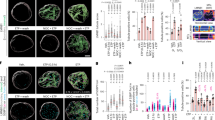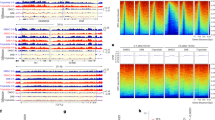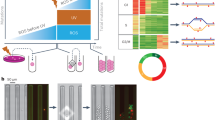Abstract
p53 and poly(ADP-ribose) polymerase (PARP) are both DNA damage recognition proteins and can be functionally activated by DNA strand breaks. To understand the functional interaction between these two proteins, the effects of a PARP inhibitor, 3-aminobenzamide (3AB), on the p53 pathway were investigated in human glioblastoma cells with different p53 status. Consistent with previous studies, irradiation with γ-rays induced both p53 and WAF1 accumulation in A-172 cells (wtp53) but not in T98G cells (mp53). However, the presence of 3AB but not its analog suppressed radiation-induced accumulation of wtp53 and the expression of WAF1 and MDM2. Similar results were also obtained from U87MG, another human glioblastoma cell line with wtp53 status. Northern blotting analysis showed that 3AB inhibited the γ-ray-induced WAF1 gene expression. Moreover, 3AB but not its analog inhibited irradiation-induced activation of sequence-specific DNA binding of wtp53 as detected using 32P-labeled or biotin-labeled p53 consensus sequence (p53CON). However, immunoblotting with an anti-poly(ADP-ribose) antibody showed that p53 proteins of the p53CON-bound fraction did not contain poly(ADP-ribose) (PAR). These findings suggested that poly(ADP-ribosyl)ation is required for rapid accumulation of p53, activation of p53 sequence-specific DNA binding and its transcriptional activity after DNA damage.
This is a preview of subscription content, access via your institution
Access options
Subscribe to this journal
Receive 50 print issues and online access
$259.00 per year
only $5.18 per issue
Buy this article
- Purchase on Springer Link
- Instant access to full article PDF
Prices may be subject to local taxes which are calculated during checkout
Similar content being viewed by others
Author information
Authors and Affiliations
Rights and permissions
About this article
Cite this article
Wang, X., Ohnishi, K., Takahashi, A. et al. Poly(ADP-ribosyl)ation is required for p53-dependent signal transduction induced by radiation. Oncogene 17, 2819–2825 (1998). https://doi.org/10.1038/sj.onc.1202216
Received:
Revised:
Accepted:
Published:
Issue Date:
DOI: https://doi.org/10.1038/sj.onc.1202216
Keywords
This article is cited by
-
Acer okamotoanum protects SH-SY5Y neuronal cells against hydrogen peroxide-induced oxidative stress
Food Science and Biotechnology (2019)
-
Caffeoylquinic Acid Derivatives Protect SH-SY5Y Neuroblastoma Cells from Hydrogen Peroxide-Induced Injury Through Modulating Oxidative Status
Cellular and Molecular Neurobiology (2017)
-
Modulation of urokinase plasminogen activator system by poly(ADP-ribose)polymerase-1 inhibition
Cytotechnology (2016)
-
RETRACTED ARTICLE: Poly(Adenosine Diphosphate-Ribose) Polymerase-1 Expression in Cutaneous Malignant Melanomas as a New Molecular Marker of Aggressive Tumor
Pathology & Oncology Research (2009)
-
Down-regulation of Wilms’ tumor 1 expression in glioblastoma cells increases radiosensitivity independently of p53
Journal of Neuro-Oncology (2007)



